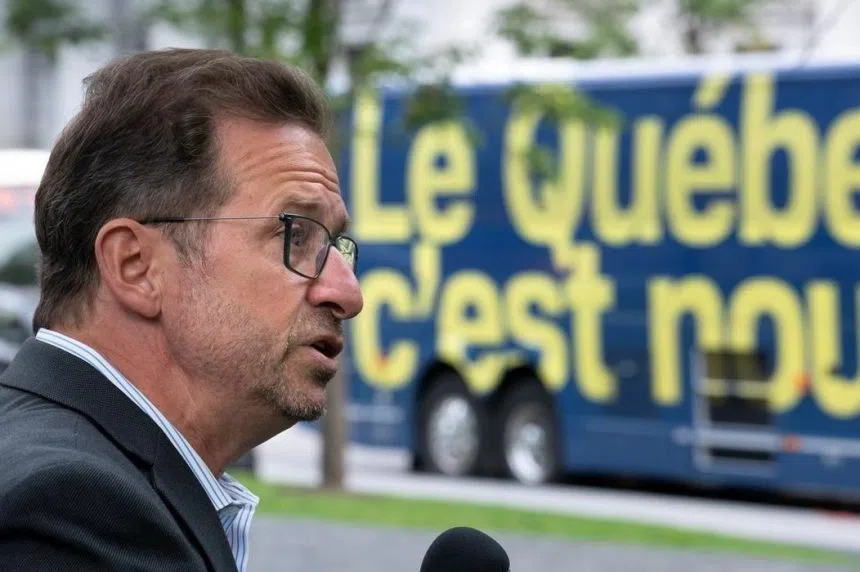OTTAWA — Four federal leaders will try to make their mark with voters on Wednesday night as they take the stage for the first French-language debate of this election campaign, which has so far shown little movement in popular opinion polls despite weeks of big-ticket promises and controversies.
Conservative Andrew Scheer, New Democrat Jagmeet Singh, and Yves-Francois Blanchet of the Bloc Quebecois will face off with Liberal Leader Justin Trudeau at 8 p.m. Eastern time, in a debate hosted by the private TVA television network and the Montreal newspaper Le Journal.
It’s the first time Trudeau will take the stage for a debate during this campaign and the stakes will be high as all four leaders seek to win over voters in a province that could ultimately decide which party gets to form government after Oct. 21.
Speaking to reporters while touring the historic Atwater Market before disappearing behind closed doors for several hours of debate prep, Singh said his main opponent in the debate would be “cynicism.”
“A lot of Canadians feel let down by Mr. Trudeau,” he said. “They feel that they had a lot of hope and a lot excitement about things that were offered and then a lot of promises were broken and people now don’t really feel that same hope and same excitement about voting.”
The reality is none of the federal parties have seen much movement — either gains or losses — in opinion polls despite weeks of campaigning, which some experts attribute variously to a degree of comfort with the status quo as well as a rise in public disillusionment and strategic voting.
The Liberals and Conservatives remain locked in a fight for first place, hovering around 33 per cent support nationally, but with the Liberals apparently having a small edge because so much Conservative support is concentrated in the Prairie provinces.
A strong Liberal showing in Quebec, where polls show them with a small but consequential lead, could sustain the Liberals in power; a strong Conservative showing could sink them.
Trudeau was able to ride a wave of unhappiness with a decade of Conservative rule under Stephen Harper to power in 2015 in an election campaign that saw the NDP start in the lead before giving way to the Tories only until voters rallied behind the Liberals to give them the win.
Four years later, Trudeau’s record in office — including his broken promise on electoral reform and decision to purchase the Trans Mountain pipeline — have turned many of those same voters, especially progressives, who cast their ballots for the Liberals.
Despite that disappointment with Trudeau, Christian Bourque, executive vice-president of polling firm Leger, said there does not seem to be the same type of overwhelming drive for change that existed in 2015, when a majority of Canadians were ready for a new direction.
“So there’s this sort of comfort with the current government, even though some may be disappointed with the leader,” Bourque said. “So there’s no urge for that amount of change. And at the same time, there’s nobody convincing them of the need for change on the other side.”
That speaks to another problem for both the Liberals and Conservatives: both Trudeau and Scheer are trailing their respective parties in popularity, making them liabilities rather than assets on the campaign trail.
Yet none of the other party leaders have been able to capitalize. Both Bourque and McMaster University assistant professor Clifton van der Linden, whose company Vox Pop Labs created the Vote Compass election tool, believe is a reflection of a rise in strategic voting in Canada.
“What’s interesting is that even though you do see fluctuations in evaluations of party leadership, those aren’t necessarily translating into vote swing,” said van der Linden.
“So a lot of people are locked into their positions, and I don’t think it’s driven by affinity for the leaders themselves. I think in many cases it’s sort of a pragmatic calculus on the part of Canadian voters in this campaign.”
That would help explain why the NDP, for example, has failed to make much progress despite Singh having run what many believe to be a smooth campaign to this point: progressive voters are worried about the Conservatives and sticking with the Liberals.
Complicating matters for all the parties is that their policy proposals aren’t very different from each other, said Bourque, noting each has promised a combination of tax cuts and more spending when it comes to affordability and helping Canadian make ends meet.
Where there are stark differences, such as on climate change, they are largely between the Conservatives and those proposed by the Liberals, the NDP and the Greens, each of whom has promised to make it a priority.
“So it’s not forcing people to coalesce on the centre to left of the political spectrum,” Bourque said.
Of course, even though it is past the halfway mark, the election campaign is far from over and Wednesday’s French-language debate was seen as an key opportunity for the four participating leaders to talk directly to Quebecers, in particular, and start gaining some momentum.
And momentum often begets momentum, said van der Linden, who noted the NDP benefited from a surprise “orange wave” in 2011 in Quebec, where many voters still haven’t decided who to support — underlining the importance of Wednesday’s debate.
“The real volatility always happens at the end of the race, because you have undecideds who aren’t factored into polling numbers,” he said.
“And I think regional Quebec is a very volatile region in terms of where those votes will go. So (Wednesday’s) debate could be really instructive as to how regional Quebec is going to swing, and that could determine the ultimate makeup of the next government.”
The Canadian Press







